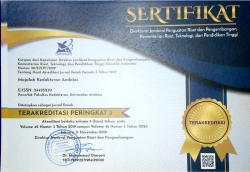Gambaran Perilaku Mengenai Nutrisi dan Perubahan Perilaku Masyarakat Mengenai Hidup Sehat Selama Pandemi COVID-19
Abstract
Introduction: COVID-19 is a disease caused by SARS Cov-2. At present, there is no specific antiviral treatment found. The most appropriate action to take is prevention to break the chain of transmission of the virus to other people. These efforts include meeting his daily nutritional needs and changing physical activity because most of his time is spent at home because he is required to do physical / social distancing.
Purpose: To get a description of the behavior regarding nutrition and changes in the behavior of the Indonesian people regarding healthy living during the COVID-19 pandemic.
Methods: This study used an analytic observational design with a cross sectional method. The samples in this study are all Indonesian people who have social media. Sampling was done using online participatory techniques.
Results: The majority of respondents have good knowledge, attitudes, and actions regarding nutrition during the COVID-19 pandemic and pay more attention to nutritional needs and physical activity to increase immunity.
Conclusion: The community has an important role in efforts to prevent the transmission of Covid-19.
Keywords: COVID-19, immunity, nutrition, physical activityKeywords
Full Text:
PDFReferences
Sohrabi C, Alsafi Z, O’Neill N, Khan M, Kerwan A, Al-Jabir A, et al. World Health Organization Declares Global Emergency: A Review of the 2019 Novel Coronavirus (COVID-19). Int J Surg [Internet]. 2020;76(February):71–6. Available from: https://doi.org/10.1016/j.ijsu.2020.02.034
Singhal T. A Review of Coronavirus Disease-2019 (COVID-19). Indian J Pediatr. 2020;87(4):281–6.
Yunus NR, Rezki A. Kebijakan Pemberlakuan Lock Down Sebagai Antisipasi Penyebaran Corona Virus Covid-19. SALAM J Sos dan Budaya Syar-i. 2020;7(3):227–38.
Allabadi H, Dabis J, Aghabekian V, Khader A, Khammash U. Impact of COVID-19 Lockdown on Dietary and Lifestyle Behaviours Among Adolescents in Palestine. Dyn Hum Heal [Internet]. 2020;7(2). Available from: http://journalofhealth.co.nz/?page_id=2170
Rodríguez-Pérez C, Molina-Montes E, Verardo V, Artacho R, García-Villanova B, Guerra-Hernández EJ, et al. Changes in Dietary Behaviours During the COVID-19 Outbreak Confinement in the Spanish COVIDiet Study. Nutrients. 2020;12(6):1–19.
Haddad C, Kheir MB, Zakhour M, Haddad R, Al Hachach M, Sacre H, et al. Association Between Eating Behavior and Quarantine/Confinement Stressors During the Coronavirus Disease 2019 Outbreak. Res Sq [Internet]. 2020;1–34. Available from: https://doi.org/10.21203/rs.3.rs-32467/v1
WHO. Brazil: WHO Coronavirus Disease (COVID-19) Dashboard | WHO Coronavirus Disease (COVID-19) Dashboard [Internet]. Who. 2020. Available from: https://covid19.who.int/%0Ahttps://covid19.who.int/region/wpro/country/cn%0Ahttps://covid19.who.int/?gclid=CjwKCAjwztL2BRATEiwAvnALcpJvfJoB2ZO9AW4cscOjOPpuNNisqVVlTkpdslGJOuXSFkrhbLCafxoCjB0QAvD_BwE%0Ahttps://covid19.who.int/region/amro/country/br
Pakpour AH, Griffiths MD. The fear of COVID-19 and its role in preventive behaviors. J Concurr Disord. 2020;2:58–63.
Woods JA, Hutchinson NT, Powers SK, Roberts WO, Gomez-cabrera MC, Radak Z, et al. The COVID-19 Pandemic and Physical Activity. Sport Med Heal Sci. 2020;2(May):55–64.
Azlan AA, Hamzah MR, Sern TJ, Ayub SH, Mohamad E. Public Knowledge, Attitudes and Practices Towards COVID-19: A Cross-Sectional Study in Malaysia. PLoS One [Internet]. 2020;15(5):1–15. Available from: http://dx.doi.org/10.1371/journal.pone.0233668
ALMughamis, N. S., AlAsfour, S., & Mehmood S (2020). Poor Eating Habits and Predictors of Weight Gain During the COVID-19 Quarantine Measures in Kuwait: A Cross Sectional Study.
Rio JF, Cecchini JA, Gimenez AM, Carriedo A. Weight Changes During the COVID-19 Home Confinement. Effects on Psychosocial Variables. Obesiti Res Clin Pract. 2020;14:383–5.
Zachary Z, Forbes B, Lopez B, Pedersen G, Welty J, Deyo A, et al. Self-quarantine and Weight Gain Related Risk Factors During the COVID-19 Pandemic. Obes Res Clin Pract [Internet]. 2020;14:210–6. Available from: https://doi.org/10.1016/j.orcp.2020.05.004
Cherikh F, Frey S, Bel C, Attanasi G, Alifano M, Iannelli A. Behavioral Food Addiction During Lockdown: Time for Awareness, Time to Prepare the Aftermath. Obes Surg. 2020;3–5.
Reyes-olavarr D, Pedro Á, Paola I, Jerez-mayorga D, Caamaño-navarrete F, Delgado-floody P. Positive and Negative Changes in Food Habits , Physical Activity Patterns , and Weight Status during COVID-19 Confinement : Associated Factors in the Chilean Population. Int J Environ Res Public Health. 2020;17(5431):1–14.
Arora T, Grey I. Health Behaviour Changes During COVID-19 and The Potential Consequences: A Mini-Review. J Health Psychol. 2020;1–9.
Jayawardena R, Sooriyaarachchi P, Chourdakis M, Jeewandara C, Ranasinghe P. Enhancing Immunity in Viral Infections, With Special Emphasis on COVID-19: A Review. Diabetes Metab Syndr Clin Res Rev [Internet]. 2020;14(4):367–82. Available from: https://doi.org/10.1016/j.dsx.2020.04.015
Oja P, Titze S. Physical activity recommendations for public health: Development and policy context. EPMA J. 2011;2(3):253–9.
Carter SJ, Baranauskas MN, Fly AD. Considerations for Obesity, Vitamin D, and Physical Activity Amid the COVID-19 Pandemic. Obesity. 2020;28(7):1176–7.
Grant WB, Lahore H, McDonnell SL, Baggerly CA, French CB, Aliano JL, et al. Evidence that Vitamin D Supplementation Could Reduce Risk of Influenza and COVID-19 Infections and Deaths. Nutrients. 2020;12(4):1–19.
Hou Z, Du F, Zhou X, Jiang H, Martin S, Larson H, et al. Cross-Country Comparison of Public Awareness, Rumors, and Behavioral Responses to the COVID-19 Epidemic: Infodemiology Study. J Med Internet Res. 2020;22(8):e21143.
Rovetta A, Bhagavathula AS. Global Infodemiology of COVID-19: Focus on Google Web Searches and Instagram Hashtags (Preprint). J Med Internet Res. 2020;22:1–9.
Rovetta A, Bhagavathula AS. COVID-19-related web search behaviors and infodemic attitudes in Italy: Infodemiological study. J Med Internet Res. 2020;22(5):1–10.
Cuan-Baltazar JY, Muñoz-Perez MJ, Robledo-Vega C, Pérez-Zepeda MF, Soto-Vega E. Misinformation of COVID-19 on the Internet: Infodemiology Study. JMIR Public Heal Surveill. 2020;6(2):e18444.





















